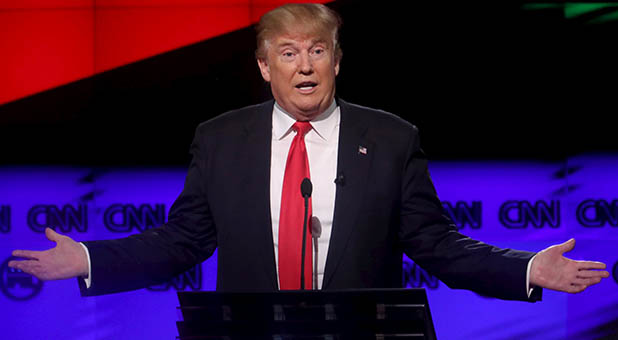Here’s the Second Option for Conservatives if Donald Trump Wins
As things stand now, Trump has 739 delegates, Senator Ted Cruz has 465, Marco Rubio (who has suspended his campaign) has 166, Governor John Kasich has 143 and the other candidates who have suspended their campaigns hold the remaining 15, with 6 uncommitted. Note that these numbers can and will shift due to varying state rules on how delegates must vote if their pledged candidate suspends his campaign.
While the math of delegate accumulation does not make a Trump outright victory inevitable, the math is on his side.
Trump won Arizona handily with a near-majority of 47 percent, and his current cache of over 700 delegates pretty much seals the math against any other candidate approaching a majority of 1,237 delegates going into the Republican National Convention.
Senator Cruz’s attempt to form an alliance with the establishment to stop Trump has not produced the votes he needs to win a pre-convention majority.
While the western primaries should be good for Senator Ted Cruz, it appears that he is not picking up the public boost from elected officials and establishment political figures that would indicate a real honest “unity movement” that brings conservative-leaning elements of the Republican establishment together with movement conservatives to actually deliver delegates to Cruz.
What I see on the part of Senator Cruz’s erstwhile establishment Republican allies is not an effort to deliver the nomination to him, but an effort to create a chaotic situation in which no outsider has a majority, thereby delivering to the Washington Cartel’s powerbrokers and insiders the ability to choose the nominee at the Convention.
If that indeed happens, then conservatives will have to face the reality of working with Donald Trump or opposing him at the GOP Convention.
So what should conservatives do if Donald Trump is the Republican nominee?
We see four convention and post-convention scenarios and, today, review scenario number 2: sitting out the election as some 4 million conservatives were alleged to have done in 2006.
Scenario #2: Pursue the “Benedict Option.” Let the establishment GOP stew in their own juices by refusing to support Trump and sitting out the election as a way of demonstrating principled opposition to Trump and the failed Republican establishment.
This option, while appealing to some individuals, should be dismissed out of hand because it guarantees victory for Hillary Clinton.
In 2006, many conservatives voiced the opinion that it was worth the risk of sitting out the election to get rid of the corrupt Capitol Hill leaders of the Republican Party.
History has shown that while getting rid of the corrupt Dennis Hastert was absolutely necessary, his removal came at a terrible price. What’s more, Hastert’s removal did not advance conservative governance. To the contrary, it put malleable dealmaker John Boehner in the Speaker’s chair and set in motion a series of deals and cave-ins that set the stage for the rise of Donald Trump and the problems conservatives now face as Trump’s support builds.
Clinton has said she would appoint radical pro-abortion, anti-First Amendment, anti-Second Amendment and anti-Tenth Amendment judges to the Supreme Court and the federal District and Appeals Courts.
Setting aside the fact that during a campaign stop in Deocorah, Iowa, Mrs. Clinton said she likes the idea of Barack Obama sitting on the Supreme Court, conservatives considering sitting out the election if Donald Trump is the Republican nominee must understand what a Hillary Clinton presidency would look like and recognize that, however distasteful Donald Trump’s lifestyle and obnoxious rants may be to cultural conservatives, they are nothing compared to the threat to constitutional liberty offered by Hillary Clinton.
On the First Amendment, Clinton said:
The Citizens United ruling should be reversed “once and for all, even if it takes a constitutional amendment,” according to MSNBC’s Ari Melber.
In Citizens United, the Supreme Court ruled that the First Amendment protects unlimited independent political expenditures by nonprofit groups. The case famously arose when Citizens United, a conservative nonprofit corporation that produces documentaries, made a movie attacking Clinton and released advertisements promoting the movie during her presidential campaign in 2008.
A federal court ruled that the regnant campaign laws banned the airing of those ads and the movie in the 30 days prior to the Democratic primaries. When the Supreme Court heard the case in 2009, President Obama’s attorneys argued that the ban was constitutional—even going to far as to say that the government could ban certain books that were to be published close to an election.
As Joel Gehrke writing for National Review observed, Justice Samuel A. Alito Jr. asked, for instance, whether a campaign biography in book form could be banned. The New York Times reported at the time that “[The Obama government’s lawyer] said yes, so long as it was paid for with a corporation’s general treasury money, as opposed to its political action committee.”
Instead of accepting Clinton’s stultifying statist view of the First Amendment, the court ruled that the government cannot deprive people of the right to engage in political speech simply because they have formed a corporation. “If the First Amendment has any force, it prohibits Congress from fining or jailing citizens, or associations of citizens, for simply engaging in political speech,” Justice Anthony Kennedy wrote in the majority opinion. The Clinton-Obama argument “would permit government to ban political speech simply because the speaker is an association that has taken on the corporate form… This troubling assertion of brooding governmental power cannot be reconciled with the confidence and stability in civic discourse that the First Amendment must secure.”
On the Second Amendment, Clinton said:
American gun owners are terrorists. “We cannot let a minority of people—and that’s what it is, it is a minority of people—hold a viewpoint that terrorizes the majority of people.” Note that, for good measure, Mrs. Clinton made it clear that it is she who intends to police the “viewpoint” of the American people.
“We’ve got to go after this,” Clinton said at a 2015 private fundraiser. “And here again, the Supreme Court is wrong on the Second Amendment. And I am going to make that case every chance I get.”
The Supreme Court’s Heller ruling, authored by the late Justice Antonin Scalia, is considered the most sweeping Second Amendment decision made by the nation’s highest court in recent years.
In Heller, the Supreme Court affirmed that the Second Amendment affirmed the inherent right of individuals to keep and bear arms whether or not they were members of an organized government militia in 2008. That ruling overturned the District of Columbia’s total ban on ownership of handguns and other strict forms of gun control.
On the Tenth Amendment, Clinton said:
“I would support states and localities that are experimenting with this [legalizing marijuana],” but regarding the states’ reserved powers on matters of regulating abortion and same-sex “marriage,” Mrs. Clinton’s view of the Tenth Amendment is not so expansive.
While most people do not want Congress involved in financing the murder of children, Hillary Clinton is not among those people.
Clinton’s idea of a “reasonable restriction” is something at “the very end of the third trimester.” But after she received Planned Parenthood’s endorsement, Clinton “really got the abortion groupies going,” as National Review‘s Ian Tuttle put it, by calling for an end to the Hyde Amendment.
In other words, said Tuttle, not only does Hillary Clinton want abortion on-demand up until the moment you can shake Junior’s hand, she also wants to force taxpayers, abortion opponents included, to pay for it. This is more than coercion; it’s public policy as vindictiveness, a taxpayer-funded middle finger at every person of goodwill with whom she disagrees.
Clinton’s idea of the outer limits of when an abortion may legally be performed is eerily reminiscent of convicted abortion murderer Dr. Kermit Gosnell’s remark about one of his victims that, “This baby is big enough to walk around with me or walk me to the bus stop.”
But abortion isn’t the only Tenth Amendment issue about which Hillary Clinton has attacked conservatives and threatens their values.
In 2008, Clinton explicitly opposed same-sex marriage, saying that she favored civil unions but that decisions about the legality of marriage should be left to the states.
But, contemplating her 2016 run for the White House, she did a sudden about-face and announced that “gay rights are human rights.”
“I believe America is at its best when we champion the freedom and dignity of every human being,” Mrs. Clinton said in a video posted by the Human Rights Campaign, a homosexual “rights” advocacy group. Her announcement came unsurprisingly just as the Supreme Court was about to hear two landmark homosexual “rights” cases that shredded the Tenth Amendment and mandated same-sex “marriage” in all 50 states.
In 2008 and 2012, some analysts looked at the numbers and concluded that some 4 million otherwise-engaged conservatives failed to vote and that their votes, distributed in the right states, could have prevented the election of Barack Obama.
The same numbers that are at work in yesterday’s Third Party campaign scenario would come into play if conservatives choose principle over politics and sit out the election.
Given that Obama won by some 5 million popular votes, what kind of a landslide in favor of Hillary Clinton would voters deliver if conservatives make an active choice to sit out the 2016 election? Such a decision could elect Hillary Clinton, hand over control of the Senate to Democrats and perhaps even remove all hindrance to Mrs. Clinton’s war on constitutional liberty by costing Republicans the majority in the House.
The “Benedict Option,” or sitting out the 2016 election, might be a choice for a few individuals who live in an ivory tower and can afford to stick to their own idiosyncratic principles; it is not a serious or rational choice for a conservative movement that aspires to lead America in the 21st century.
On Monday, join us for Part 3 of the series: Scenario #3: Should conservatives join the establishment Republican insiders to manipulate the convention to deprive Trump of the nomination?
George Rasley is editor of ConservativeHQ, a member of American MENSA and a veteran of over 300 political campaigns, including every Republican presidential campaign from 1976 to 2008. He served as lead advance representative for Governor Sarah Palin in 2008 and has served as a staff member, consultant or advance representative for some of America’s most recognized conservative Republican political figures, including President Ronald Reagan and Jack Kemp. He served in policy and communications positions on the House and Senate staff, and during the George H.W. Bush administration he served on the White House staff of Vice President Dan Quayle.
























































